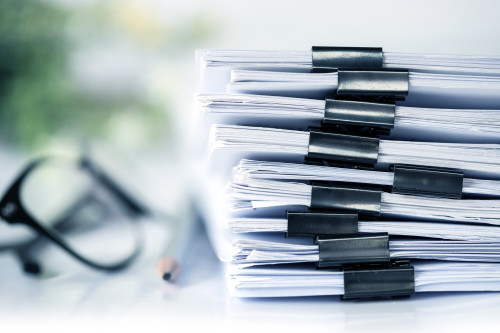29th Mar 2021
How Should You Store and Organize Your Legal Documents?
It is important to keep confidential and essential legal documents safe and organized. Check out these tips on document storage and organization.
The average American wastes about 4.3 hours weekly searching for paper. It’s an exercise that eats up valuable time that could have been spent doing something else. More than that, it piles up stress on the worker and reduces their concentration and creative thinking.
The financial impact of a disorganized workspace is substantial. A disorganized employee who earns $50,000 annually costs the company an additional $11,000 in wasted time.
These statistics point to the importance of keeping your office neat and orderly. The need for organization is even greater when you handle legal documents regularly. Owing to the highly sensitive information these documents contain, losing one of them can have far-reaching consequences.
In this article, we give you seven practical tips for legal document organization and storage, so you remain efficient and productive at all times. Keep reading to find out everything you need to know to stay organized.
Start by Evaluating Your Current Organization System
If you already have a legal document paper organization system, take a close look at it. How have you been organizing your case files? Does the system follow a specific logic?
Understandably, different law practices organize their files differently. A criminal law practice may adopt a different filing approach than a personal injury law firm. That’s because their cases adopt different document filing systems based on evidence and procedure.
The important thing here is to assess how the system you now have is running. Once you establish this, it’s easier to know which areas need improvement or whether you should set an entirely fresh organization system.
Declutter Your Working Space
This is arguably the most difficult step for many law practitioners, especially those who believe in an organized mess. The fact is, if you’re going to have a neat office, you must rid your office of all that clutter.
Decluttering your office leaves you with acres of free space. Now, you have room for only the essential legal documents. You no longer have to spend an entire morning looking for a client’s file or do things twice when you can’t trace a motion you need to file in a few hours.
Create a Keep or Throw-Away Box
Sure, you’ve decluttered your office, but that doesn’t mean that you won’t be dealing with tons of paperwork going forward. As an attorney, you need to keep a lot of paperwork in each case you work. But some of this paperwork won’t stay relevant from the beginning to the end of the case.
Sometimes, you’ll receive duplicates of documents you’ve already filed. Decide right away whether every document you receive is worth keeping or whether you should throw it away. That way, you avoid ending up with clutter all over again.
Separate Legal Documents by Type
After decluttering your office, it’s time to organize the remaining legal documents. Start by sorting all your paper into categories, such as client documents, correspondence, client medical records, deposition transcripts, and so on.
If you were putting all your legal documents in a single file under your previous system, now’s the time to do things differently. Consider using binder divider tabs to separate different categories of documents, so it’s easier to identify them.
Use Alphabetical or Chronological Order
After you’ve separated your documents by category, go a step further to sort each document in alphabetical or chronological order.
You can alphabetize files by client name or using major categories, such as client documents or deposition transcripts. Make sure the system you choose fits within your workflow and feels natural.
When it comes to chronological sorting, you can do it using the dates on the documents. If you had alphabetized files by client name, you could place these documents from the newest to the oldest or vice versa. Undated files can be organized by importance.
Organize the Filing Space
When it comes to legal document storage, most law firms use filing cabinets and drawers for physical documents. You can still continue using the alphabetical or chronological approach when placing your file folders into your drawers and cabinets.
The best thing with storing your paperwork into cabinets away from your desk is that you have enough workspace to complete tasks efficiently. Make sure that your shelves are assigned specific files and subtypes to maintain categorization.
Label Your Files
Labeling your filing system makes it easy for you to trace documents when you need them. Most folders come with a designated space for you to make your own label. You can choose to handwrite the label or print it out.
To optimize how you label, you can use different colored pens, especially if you have color-coded your shelves.
Adhere to Your Filing System
As soon as your filing system is up and running, do your best to make it stick. After all, you didn’t invest all those resources to watch everything go to waste.
One way to ensure that everyone in the office follows the filing system is to develop a checklist. You can go a step further to create a custom checklist for each type of case. These checklists help keep all your employees on track.
Evaluate Your Filing System Regularly
Even the best filing systems can still be improved. That’s why it helps to evaluate how efficient your filing system is from time to time and see where there are gaps that you can improve. Take the time to learn the latest trends in legal document filing systems and see which ones can help elevate your legal practice.
Stay on Top of Your Legal Documents Filing System
As a legal practice, how you organize legal documents plays a major role in how efficient you are. By adopting the right filing system, you can cut the amount of time your team wastes tracking essential documents and boost overall productivity in your firm.
Are you interested in the best filing solutions for your legal documents? Please, contact us today.




